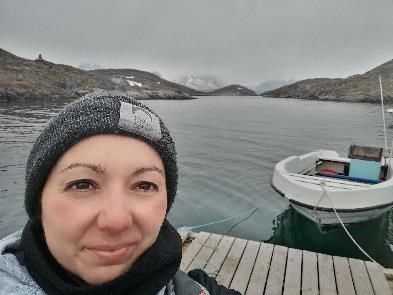“I am a professor in Civil Engineering at Université Laval. My research is on water quality and access in Northern communities in Canada. I had the chance to be invited to be a supervisor in the Arctic WASH summer school 2023 organized by the Technical University of Denmark (DTU) in the Arctic DTU Campus in Sisimiut, Greenland, Denmark. A group of 50 students and supervisors participate to this summer school. Groups were formed to work on different case studies. Our group worked on water and sanitation for Greenlandic settlements with limited water resources. The summer school was followed by a workshop with local and regional water authorities to discuss alternative sanitary solutions to honey buckets.
Arctic WASH summer school 2023 –Sisimiut & Itilleq, June 26 to July 2, 2023
In rural Greenland 80% of the population (almost 2000 homes) live without piped water installed in their homes, thus inhabitants must fetch water by outdoor public taps. This results in a very low water consumption (between 13 and 23 L/d/cap) which is in theory not sufficient to sustain public health and can present risks for the population related to water quality degradation with household storage. All homes without piped water use a honey bucket for sanitary service (toilet with bags used to collect excreta). Innovation is therefore needed to develop solutions to improve hygiene and comfort with low water usage.
The purpose of the work of the students I supervised during this summer school was to come up with criteria for good solutions for water and sanitation services based on the needs and preferences of people living in rural Greenland and evaluate potential solutions according to those criteria. The case study for the exercise was the small settlement of Itilleq (population 89 in 2020), located 40km south of Sisimiut by boat.
Workshop on alternative sanitary solutions – Sisimiut, July
This summer school was followed by a workshop with local and regional water authorities to discuss alternative sanitary solutions to honey buckets.
In Greenland, in total around 4800 homes use honey buckets, which includes almost all homes rural Greenland. homes without piped water and homes with running water but no sewer. Even if, in the far future investments into providing piped water and sewer to all homes where feasible, still some settlements cannot be serviced, simply because the raw water resource is insufficient to meet recommended levels to sustain health. Locals in Greenland have built many small simple cabins for weekend leisure. If equipped with toilet facilities at all, they are equipped with a honey bucket. Tourists and travelers would have a potential great experience by hiking to and spending time in such cabins -and locals could make a bit of money renting them to tourists, when not using them themselves. However, hikers/tourists cannot be expected to empty honey bucket toilets and handling solid waste in the wilderness themselves. This workshop aims to gather experts and local and regional authorities to discuss innovative solutions to improve hygiene and comfort with low water usage in Greenland.”

